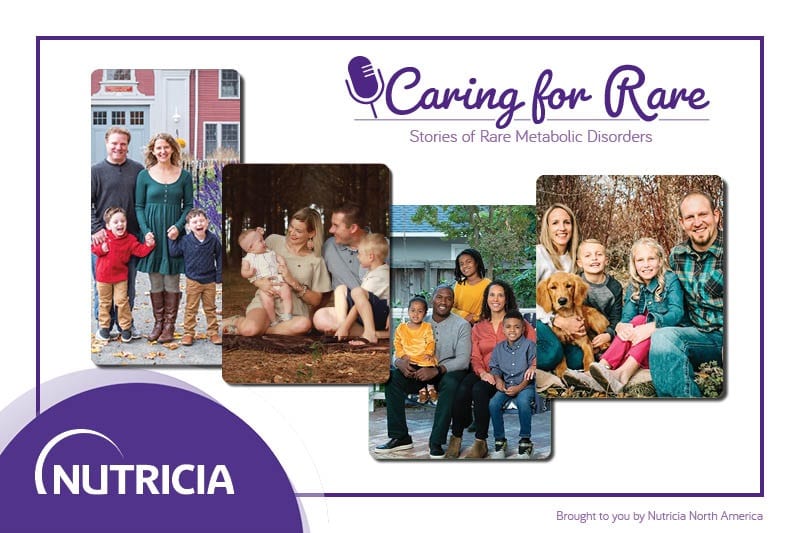Parents of children with PKU, MSUD and HCU share their experiences with adapting to a special low protein diet

Nutricia North America’s podcast – Caring for Rare – explores what life is like with a rare metabolic disorder such as phenylketonuria (PKU), maple syrup urine disease (MSUD), and homocystinuria (HCU). Episodes feature families’ personal stories of inborn errors of metabolism. Our guests on the show share their difficulties at diagnosis, changes they made to adapt to condition management, everyday joys, and more.
Though these disorders are rare, it is possible to find community and support. We hope you’ll feel comfort and connection in the stories of Caring for Rare.
Note: the interviews and anecdotes featured in these podcast episodes may not be representative of all rare metabolic disorders, and this podcast in no way replaces the guidance and supervision of metabolic healthcare professionals. Always consult your metabolic healthcare team prior to making any changes to diet or condition management. Guests on Caring for Rare are compensated for their time.
Listen now to Julie, Lacy, Jordann, Andre, Cole and Sarah as they talk about what it means to their families to be on a low protein diet.
Caring For Rare is also available on Apple, Google Podcast, Amazon Music and other podcast hubs!
Being on a special diet can be difficult not only for the child with a metabolic disorder, but for the entire family. Families must learn to measure metabolic formula, realize the fact that their child’s diet will be completely different from their own and that of other siblings, family members and friends. Listen in and hear how four families are navigating the challenges of a low protein diet: From the emotional toll, to being short-order cooks, to embracing their “new normal” and finding ways to make life easier.
Here are a few excerpts of our conversations with the families in Episode 4, Season 1 of Caring for Rare:
JULIE: Feeding your kid is the most basic thing that you can do as a mother. And, like, I can’t feed my kid the way I want to. And I didn’t even fully understand the way I was supposed to at first.
LACY: So what has been the most helpful for you to manage your family life?
JULIE: I, I’m somebody that I tend to do everything. Like I take on the world. And I had this expectation of what parenting would be and what type of mother I would be. And so letting go of that, and asking for help. Letting my husband help even, because at first I wasn’t even letting that happen. And now it’s about 50/50 in the management. So I basically handle all the food and writing everything down and he handles the formula. It feels very doable because we both take on some part of it.
COLE: After they were diagnosed, we didn’t go out to dinner. We didn’t go out to eat. We didn’t go to functions. We, we stayed home. We stuck around the house, our comfort zones where we had meals and we had the food that the kids could eat. I remember times when you would have Mac and cheese. I remember you leaving the room.
SARAH: And we had a great dietitian that I could call and email any time of the day. And she really helped us through a lot of things like how do we approach our first birthday party and different things like that. So, I think also after you get your first holiday under your belt, your first birthday party, your first birthdays, once we got all of those things done it’s not the end of the world and we’re going to do it.
ANDRE: You know, it’s a modified diet. Again, there will be some bumps along the way, but it’s a modified diet and there are certain foods that I don’t like. So, it’s not the worst thing in the world.
JORDANN: I think my advice for new parents is that eventually, things will be OK. There is a really steep learning curve in the beginning because pretty much one hundred percent of the time nobody has ever heard of MSUD before you get a call about the diagnosis. So, it’s scary, especially when you know what some of the severe complications are. But with proper diet and drinking formula, kids really can lead normal lives.
Listen to the full episode to hear more about how these families manage food at home. You can find Caring for Rare on our website, as well as on Spotify, Apple, and other podcast hubs. Stay tuned for more Caring for Rare episodes!
Caring for Rare: Stories of Rare Metabolic Disorders is brought to you by Nutricia North America. It was produced by Alletta Cooper, Ulrike Reichert, and Kate Miley. Transcript available here.
Always consult your metabolic healthcare professional team prior to making any changes to diet or condition management.
© 2022 Nutricia North America
